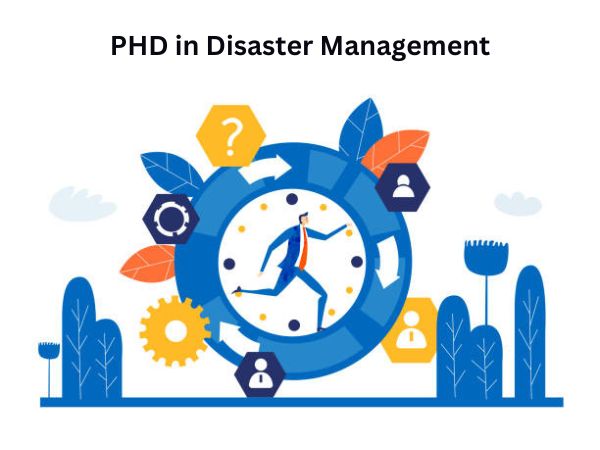Ph.D. in Disaster Management: Introduction, Admission, Registration, Eligibility, Duration, Fees, Syllabus 2024

Introduction:
In a world marked by unpredictable natural disasters and human-induced crises, the need for effective disaster management has never been more critical. Pursuing a Ph.D. in Disaster Management equips individuals with the knowledge and skills to mitigate risks, respond to emergencies, and foster resilience in communities facing adversity.
Admission Process:
- Research Proposal Submission: Applicants are required to submit a comprehensive research proposal outlining their intended study area within Disaster Management.
- Academic Transcripts: Academic transcripts showcasing relevant qualifications and academic achievements are reviewed.
- Letters of Recommendation: Strong letters of recommendation from academic mentors or professionals in the field carry significant weight.
- Statement of Purpose: A compelling statement outlining the applicant's motivations, aspirations, and alignment with the program's objectives.
- Interview (if applicable): Shortlisted candidates may undergo interviews to assess their suitability for the program and research fit.
Eligibility:
- Educational Background: A master's degree in Disaster Management, Emergency Management, Public Administration, or a related field is typically required.
- Research Experience: Prior research experience, preferably in disaster-related topics, is advantageous.
- Professional Experience: Experience working in disaster management, emergency response, humanitarian aid, or related fields is often valued.
- Analytical Skills: Strong analytical and critical thinking skills essential for conducting in-depth research and problem-solving.
- Language Proficiency: Proficiency in the language of instruction, often English, is mandatory.
- Commitment to Service: A demonstrated commitment to serving communities and fostering resilience in the face of disasters.
Completion Time:
The completion time for a Ph.D. in Disaster Management varies depending on factors such as research complexity, funding availability, and individual progress. Typically, it ranges from four to seven years, including dissertation research and writing.
Career Opportunities:
- Emergency Management Agencies: Roles in government agencies responsible for coordinating emergency response efforts, disaster preparedness, and recovery operations.
- Non-Profit Organizations: Positions with non-profit organizations and humanitarian agencies involved in disaster relief, community development, and resilience-building initiatives.
- Research Institutes: Opportunities to work in research institutes focused on disaster risk reduction, vulnerability assessment, and disaster management policy analysis.
- Consultancy: Consulting opportunities providing expertise in disaster risk management, resilience planning, and capacity-building for governments, organizations, and communities.
- Academia: Teaching and research positions in universities and academic institutions offering programs in Disaster Management and related fields.
Syllabus:
- Disaster Risk Assessment: Techniques for assessing and analyzing disaster risks, vulnerabilities, and impacts on communities and infrastructure.
- Emergency Response Planning: Strategies for developing emergency response plans, including coordination mechanisms, resource allocation, and communication protocols.
- Disaster Recovery and Reconstruction: Principles and practices of disaster recovery and reconstruction, focusing on rebuilding communities and restoring livelihoods.
- Humanitarian Assistance and Relief Operations: Understanding the principles of humanitarian assistance, including needs assessment, logistics, and coordination in disaster-affected areas.
- Policy and Governance in Disaster Management: Analysis of policies, laws, and governance structures related to disaster management at local, national, and international levels.
- Community Resilience Building: Approaches to building community resilience through participatory planning, capacity-building, and social cohesion.
- Research Methods in Disaster Management: Research methodologies and techniques for conducting empirical studies in Disaster Management, including qualitative and quantitative approaches.
Internship Opportunities:
- Government Agencies: Internship opportunities with government agencies responsible for disaster management, emergency response, and public safety.
- Non-Governmental Organizations (NGOs): Internships with NGOs and humanitarian organizations involved in disaster relief, community development, and resilience-building initiatives.
- International Organizations: Internship roles with international organizations such as the United Nations, focusing on disaster risk reduction, humanitarian aid, and emergency response.
- Research Institutes: Internships with research institutes conducting studies on disaster management, vulnerability assessment, and resilience-building.
- Private Sector: Internship opportunities with private companies involved in disaster risk management, emergency preparedness, and crisis communication.
Scholarships and Grants:
- Disaster Management Scholarships: Scholarships specifically designed for students pursuing higher education in Disaster Management or related fields.
- Research Grants: Funding opportunities through research grants provided by government agencies, foundations, or non-profit organizations supporting disaster research.
- Merit-Based Scholarships: Scholarships awarded based on academic merit and achievements in Disaster Management or related fields.
- Humanitarian Aid Scholarships: Scholarships offered by humanitarian organizations or agencies supporting students interested in disaster relief and emergency response.
- Government Scholarships: Scholarships provided by government agencies to support students pursuing studies in disaster management and emergency preparedness.
FAQs:
Can I pursue a Ph.D. in Disaster Management without a background in emergency management or related fields?
While a background in emergency management or related fields is beneficial, many programs welcome students with diverse academic backgrounds and professional experiences.
How can a Ph.D. in Disaster Management contribute to improving disaster response and resilience in communities?
Ph.D. graduates in Disaster Management play critical roles in conducting research, developing policies, and implementing practices that enhance disaster response, recovery, and community resilience.
Are there opportunities for international students to pursue a Ph.D. in Disaster Management?
Yes, many universities offer Ph.D. programs in Disaster Management and related fields, welcoming international students and providing support services tailored to their needs.
What types of research topics can be explored in a Ph.D. in Disaster Management?
Research topics can range from analyzing the effectiveness of disaster response strategies to studying the socio-economic impacts of disasters on vulnerable populations, among others.
How can I make a meaningful contribution to the field of Disaster Management beyond academia?
Beyond academia, there are numerous opportunities to contribute to Disaster Management through involvement in policy advocacy, community engagement, volunteering with disaster relief organizations, and implementing resilience-building initiatives.





